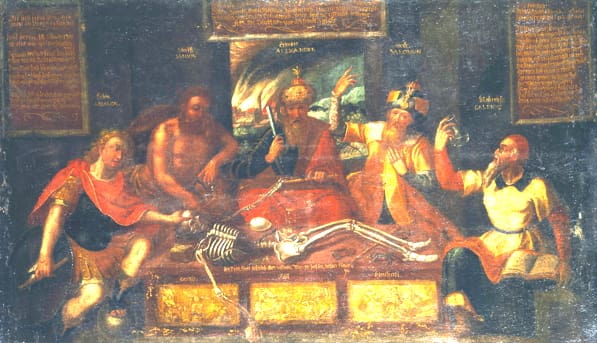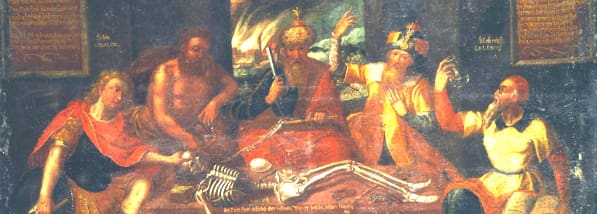UNHAPPY LIFE OF THE SINNER
HAPPY LIFE OF THE CHRISTIAN WHO LOVES GOD
“There is no peace to the wicked, saith the Lord.” (Isaiah 48:22)
“Much peace have they that love thy law.” (cf Psalm 119:165)
In this life all men seek after peace. The merchant, the soldier, the man who goes to law, labor with the hope of making a fortune, and of thus finding peace, by worldly lucre, by a more exalted post, by gaining a lawsuit. But poor worldlings seek from the world that peace which the world cannot give. God alone can give us peace. The holy church prays in the following words: “Give to thy servants that peace which the world cannot give.” No; the world, with all its goods, cannot content the heart of man; for he was created, not for them, but for God alone; hence God alone can make him happy and content. Brute animals, that have been made for sensual delights, find peace in earthly goods: give to an ox a bundle of hay, and to a dog a piece of flesh, and they are content; they desire nothing more. But the soul, which has been created for no other end than to love God, and to live in union with him, shall never be able to find peace or happiness in sensual enjoyments; God alone can make her perfectly content.
The Son of God gave the appellation of fool to the rich man who, after having reaped a rich harvest from his fields, said to himself, “Soul, thou hast much goods laid up for many years; take thy rest; eat, drink, and make good cheer” (Luke 12:19). “Stulte,” says St. Basil, ”numquid animam porcinam habes?” Miserable fool! Have you the soul of a swine, of a brute, that you expect to make it happy by eating, drinking, or by sensual delights? “Requiesce, comede, bibe.” A man may be puffed up, but he cannot be satisfied by the goods of this world. “Inflari potest,” says St. Bernard, “satiari non potest.” On the words of the Gospel, ”Behold, we have left all things” the same St. Bernard writes that he saw different classes of fools laboring under different species of folly. All had a great thirst for happiness; some were satiated with the goods of this earth, which is a figure of the avaricious; others with wind, the figure of the ambitious, who seek after empty honors; others, seated round a furnace, swallowed the sparks that were thrown from it; these were the passionate and vindictive; others, in fine, drank putrid waters from a fetid lake; and these were the voluptuous and unchaste. Hence, turning to them, the saint exclaims, “O fools, do you not see that these things increase, rather than diminish, your thirst?” “Haec potius famem provocant quam extinguunt?” The goods of the world are but apparent goods, and therefore they cannot satisfy the heart of man. “You have eaten,” says the prophet Haggai, “but have not had enough” (cf Haggai 1:6). Hence, the more the avaricious man possesses, the more he seeks to acquire. “Major pecunia,” says St. Augustine, “avaritiae fauces non claudit, sed extendit.” The possession of great wealth does not close, but rather extends, the jaws of avarice. The more the unchaste man wallows in the mire of impurity, the greater is his disgust, and, at the same time, his desire for such beastly pleasures; and how can dung and carnal filthiness content the heart? The same happens to the ambitious man who wishes to satisfy his desires by smoke; for he always attends more to what he wants than to what he possesses. After having acquired some many kingdoms, Alexander the Great wept, because he had not dominion over other countries. If worldly goods could content the human heart, the rich and the monarchs of the earth should enjoy complete happiness; but experience shows the contrary. Solomon tells us that he refused no indulgence to his senses. “Whatsoever my eyes desired, I refused them not” (Ecclesiastes 2:10). But after all his sensual enjoyments, what did he say? “Vanity of vanities, and all is vanity” (Ecclesiastes 1:2). That is, everything in this world is mere vanity, a pure lie, pure folly.
After having acquired some many kingdoms, Alexander the Great wept, because he had not dominion over other countries. If worldly goods could content the human heart, the rich and the monarchs of the earth should enjoy complete happiness; but experience shows the contrary. Solomon tells us that he refused no indulgence to his senses. “Whatsoever my eyes desired, I refused them not” (Ecclesiastes 2:10). But after all his sensual enjoyments, what did he say? “Vanity of vanities, and all is vanity” (Ecclesiastes 1:2). That is, everything in this world is mere vanity, a pure lie, pure folly.
Affections and Prayers
Ah, my God, what now remains of all the offenses I have offered to thee, but pains, bitterness, and merits for hell? I am not sorry for the pain and remorse which I now feel; on the contrary, they console me because they are the gift of thy grace, and make me hope that, since thou inspirest these sentiments, thou wishest to pardon me. What displeases me is the pain I have given thee, my Redeemer, who hast loved me so tenderly. I deserved, O my Lord, to be abandoned by thee; but, instead of abandoning me, I see that thou dost offer me pardon, and that thou art the first to ask for a reconciliation. O my Jesus, I wish to make peace with thee, and desire thy grace more than every earthly good. I am sorry, O infinite Goodness, for having offended thee; I would wish to die of sorrow for my offenses. Ah! Through the love which thou didst entertain for me when thou didst expire on the cross, pardon me, receive me into thy heart, and change my heart, so that henceforth I may please thee as much as I have hitherto offended thee. I now renounce, for thy sake, all the pleasures which the world can give me, and I resolve to forfeit my life rather than lose thy grace. Tell me what I must do in order to please thee; I wish to do it. What pleasures, what honors, what riches can I seek? I wish only for thee, my God, my joy, my glory, my treasure, my life, my love, my all. Give me, O Lord, strength to be faithful to thee. Give me the grace to love thee, and then do with me what thou pleasest. Mary, my mother and my hope, take me under thy protection, and obtain for me the grace to belong entirely to God.
Editor’s Note: This meditation is from St. Alphonsus Liguori’s “Preparation for Death” (1758).
Art: Vanitas-Allegorie mit historisch/biblischen Gestalten (Alexander der Große, Absalon, Samson, Salomo, Galenus) und Skelett [Vanitas (Vanity) allegory with historical/Biblical figures (Alexander the Great, Absalon, Samson, Solomon, Galenus) and skeleton], anonymous, 17th century, PD-US copyright expired, Wikimedia Commons.




